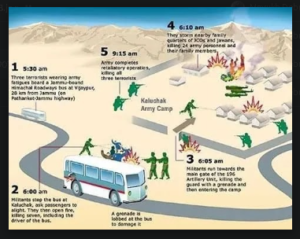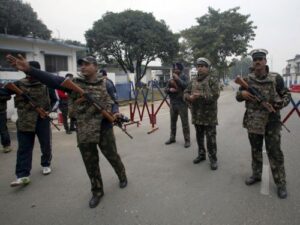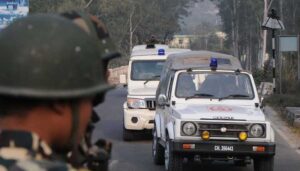[ Reported as seen ]
Terrorists crossed the Line of Control from Pakistan, boarded a bus at Vijaypur, and attacked passengers near Kaluchak. They killed the driver, conductor, and fired upon the bus. Indian soldiers retaliated, engaging in a firefight with the terrorists dressed in Indian army attire. The attackers attempted to escape to the Army’s family quarters, throwing grenades and firing at vehicles. Once inside the quarters, they targeted Army family members. By 10 am, the terrorists were cornered and killed. The death toll included 31 victims, including Army personnel, Army family members, and civilians. The investigation revealed that the terrorists were Pakistani nationals, and items found on them linked them to purchases in Zafarwal, Pakistan.
Introduction
The Kaluchak Massacre was a horrific terrorist attack that took place on May 14, 2002, near the town of Kaluchak in the Indian state of Jammu and Kashmir. The incident unfolded when three militants launched an assault on a bus belonging to the Himachal Road Transport Corporation. The bus was en route from Manali to Jammu, carrying passengers from Himachal Pradesh. In a gruesome act, the militants mercilessly killed seven individuals on board the bus.

However, the horror did not end there. The militants, after targeting the bus, proceeded to the family quarters of the Army, where they callously opened fire without discrimination. The residents, innocent and defenseless, faced the brutal wrath of the attackers. Tragically, 23 individuals lost their lives in this merciless act of violence. Among the victims were ten children, eight women, and five Army personnel. The young lives taken away ranged from four to ten years of age, emphasizing the heinous nature of the attack. Additionally, thirty-four individuals sustained injuries during the assault, further deepening the scars left by this tragic event.
The Kaluchak Massacre sent shockwaves through the region, highlighting the ongoing threat of terrorism in Jammu and Kashmir. The attackers demonstrated a complete disregard for human life, targeting both civilians and Army personnel. The incident not only claimed the lives of innocent individuals but also shattered the peace and security of the community.
The aftermath of the massacre witnessed a wave of grief and outrage, with the nation mourning the loss of innocent lives. The incident underscored the need for heightened security measures and a resolute stance against terrorism. Efforts were intensified to bring the perpetrators to justice and prevent future acts of violence.
The Kaluchak Massacre stands as a tragic reminder of the devastating consequences of terrorism and the need for sustained efforts to combat this menace. It serves as a solemn testament to the resilience and determination of the affected community and the nation as a whole in their fight against terrorism and the pursuit of peace.
The massacre
The Kaluchak Massacre, which unfolded on May 14, 2002, near the town of Kaluchak in the Indian state of Jammu and Kashmir, was a harrowing terrorist attack that left a lasting scar on the affected community. The perpetrators reportedly infiltrated from Pakistan, crossing the Line of Control, and boarded a bus at Vijaypur. As the bus approached Kaluchak, they initiated their assault by shooting the driver and conductor and opening fire on the unsuspecting passengers. In response to the gunfire, Indian army soldiers, alerted by the commotion, swiftly retaliated by firing back at the attackers. The terrorists, disguised in Indian army fatigues, engaged in a fierce exchange of gunfire and attempted to flee to the Army’s family quarters situated along the main road. Along their path, they callously threw grenades at parked vehicles in the vicinity.
Upon entering the family quarters, the militants continued their indiscriminate firing, targeting the Army family members present in the premises. The chaos and terror unleashed by the attackers devastated the lives of those residing in the quarters. The terrorists’ ruthless actions demonstrated a complete disregard for human life and a chilling intent to sow fear and chaos within the community.
The authorities responded swiftly to the unfolding tragedy. By 10 am, the terrorists were successfully cordoned off and neutralized, bringing an end to their reign of terror. However, the toll of their brutal assault was devastating. The attack claimed the lives of 31 individuals, including three Army personnel, 18 Army family members, and ten civilians. Among the deceased were ten children, innocent lives cruelly cut short. The number of wounded reached 47, including 12 Army personnel, 20 Army family members, and 15 civilians. The physical and emotional scars left behind by this tragic event would forever haunt the survivors and the community at large.

Indian investigations into the incident uncovered crucial details about the perpetrators. All three terrorists responsible for the massacre were identified as Pakistani nationals. Their names were revealed as Abu Suhail from Faisalabad, Pakistan; Abu Murshed (Mohammed Munir) from Salamatpura in Gujranwala, Pakistan; and Abu Javed (Amzad Salam Bin Mohammed Gisha) from Guda Giriya Gujranwala, Pakistan. The discovery of biscuits and chocolates on the gunmen further pointed to their origin in Zafarwal, Pakistan. These revelations shed light on the cross-border nature of the attack and raised serious concerns about the state-sponsored terrorism emanating from across the border.
The Kaluchak Massacre shook the entire nation and ignited a wave of grief and outrage. The attack not only targeted the Indian Army and its personnel but also struck at the heart of the Army’s family community, a closely knit group that suffered unimaginable losses. The incident exposed the vulnerability of civilians living in close proximity to military establishments and emphasized the urgent need for enhanced security measures to protect them.

In the aftermath of the tragedy, the Indian government and security forces intensified their efforts to bring the perpetrators and their handlers to justice. The incident served as a stark reminder of the ongoing threat posed by terrorism and the need for a united front in the fight against this menace. It reinforced the nation’s resolve to dismantle terrorist networks and ensure the safety and security of its citizens.
The scars of the Kaluchak Massacre continue to be felt, serving as a solemn reminder of the human toll inflicted by acts of terror. The resilience and unity displayed by the affected community in the face of adversity have been commendable. It is through their unwavering spirit and the collective determination of the nation that steps can be taken to prevent such horrific incidents in the future and safeguard the principles of peace, harmony, and justice.
Indian reaction
The Kaluchak Massacre, occurring in May 2002, left an indelible mark on the collective memory of India. Prime Minister Atal Bihari Vajpayee described the incident as a “most inhuman and brutal carnage,” highlighting the heinous nature of the act. The magnitude of the tragedy was felt deeply, leading to hundreds of army personnel and their families gathering for candlelight prayers in remembrance of the victims. The massacre stands as one of the most devastating terrorist attacks in Jammu and Kashmir.
According to Jaswant Singh, the Minister for External Affairs at the time, the Kaluchak incident brought India and Pakistan to the brink of war. In his book, “A Call To Honour – In Service of Emergent India,” Singh reveals that this incident was the final straw during the tense period of the 2001-2002 India-Pakistan standoff. The attack marked the closest the two nations had ever come to open conflict, with severe repercussions looming in the aftermath.
Indian Union Minister of State for External Affairs, Omar Abdullah, unequivocally blamed Pakistan for the massacre. He called attention to the “sheer barbarity” of the attack and advocated for an escalated response against Pakistan. Chief Minister of Jammu and Kashmir, Farooq Abdullah, also held Pakistani intruders responsible for the atrocity, condemning their actions as inhumane and referring to them as “animals.”
The sentiments expressed by Indian leaders were echoed by the Members of Parliament, who unanimously placed blame on Pakistan for the attack. This collective stance served as a powerful statement against the cross-border terrorism that India had been grappling with for years. The unity displayed by the Indian government and its representatives demonstrated a resolute determination to hold those responsible accountable and to address the threat posed by extremist elements.
The Kaluchak Massacre serves as a stark reminder of the deep-rooted challenges faced by India in its quest for peace and security in the region. The incident exposed the extent to which terrorist groups were willing to go to inflict harm and create havoc. The brutal nature of the attack and the loss of innocent lives amplified the urgency of combating terrorism and dismantling its support networks.
The aftermath of the massacre witnessed heightened tensions between India and Pakistan, with both countries facing the delicate task of de-escalating the situation. Diplomatic efforts and international pressure played a crucial role in preventing further deterioration and steering the nations away from the precipice of war. The incident served as a turning point, underscoring the need for sustained dialogue and cooperation to address the root causes of the conflict and prevent such tragedies from recurring.
The unanimous condemnation by Indian leaders and the overwhelming support from the Members of Parliament reflected a collective national resolve to hold Pakistan accountable for its role in the attack. It was a testament to the unwavering commitment of the Indian government and its people to safeguard the security and well-being of its citizens.
The scars left by the Kaluchak Massacre continue to serve as a poignant reminder of the human cost of terrorism. The incident sparked a renewed determination to strengthen security measures and intelligence sharing, both domestically and internationally, to prevent future acts of violence. It also underscored the imperative of addressing the underlying causes of extremism and fostering a climate of peace, tolerance, and mutual respect.
In the face of adversity, the nation stood united, displaying resilience and resolve. The memory of the victims lives on as a constant reminder of the need to remain vigilant and steadfast in the pursuit of peace and justice. Through continued efforts, both domestically and in collaboration with the international community, India strives to create a world free from the scourge of terrorism, where the lives and aspirations of its citizens are protected and nurtured.
International reaction
The Kaluchak Massacre in Jammu and Kashmir drew condemnation from leaders around the world, reflecting the global outrage at the heinous act. President George W. Bush of the United States denounced the massacre as a “terrible and outrageous act,” expressing his deep dismay and shock at the incident. The international community rallied behind India, offering condolences and support in its ongoing struggle against terrorism in the region.
The Presidency of the European Union issued a strong condemnation, describing the attack as a brutal act of terrorism that resulted in the loss of numerous innocent lives. The EU expressed sympathy to the Government of India, acknowledging the challenges it faced in controlling terrorism in Kashmir. Germany, Japan, and Russia also voiced their condemnation of the massacre, aligning themselves with the global consensus against such acts of violence.
In a significant development, Pakistan took action by arresting Hafiz Muhammad Saeed, the chief of Lashkar-e-Taiba, thereby bolstering the group’s suspected connection to the attack. This arrest added weight to the claims of Lashkar-e-Taiba’s involvement and demonstrated a willingness on Pakistan’s part to address the issue of terrorism emanating from its soil.
The Australian government responded to the Kaluchak Massacre by declaring Lashkar-e-Taiba a terrorist organization in 2003. This decision, made in part as a response to the brutal incident, reflected Australia’s commitment to combatting terrorism and its determination to stand against those groups perpetrating such acts of violence. By designating Lashkar-e-Taiba as a terrorist organization, Australia joined the international community in recognizing the need to confront and dismantle extremist organizations that pose a threat to global peace and security.
The global response to the Kaluchak Massacre underscored the solidarity and collective resolve of nations in the face of terrorism. Leaders from different corners of the world expressed their unequivocal condemnation, emphasizing the universality of the principles that safeguard human life and well-being. The incident served as a stark reminder of the shared responsibility to combat terrorism in all its forms, regardless of geographical boundaries.
The actions taken by Pakistan in arresting Hafiz Muhammad Saeed and the Australian government’s declaration against Lashkar-e-Taiba demonstrated the recognition of the need to confront the root causes of terrorism and disrupt the networks that enable its operations. These steps aimed to address the underlying factors that contribute to extremism and underscored the importance of international cooperation in combating terrorism.
The Kaluchak Massacre not only affected India but reverberated across the globe, eliciting condemnation and solidarity from leaders worldwide. It served as a poignant reminder of the urgent need to confront and dismantle terrorist organizations that threaten peace and stability. The global response demonstrated a collective commitment to upholding the fundamental values of peace, justice, and human rights.
As the international community united in its condemnation, efforts to combat terrorism were galvanized, with nations collaborating to enhance security measures, intelligence sharing, and counter-terrorism strategies. The tragedy of the Kaluchak Massacre fueled a determination to prevent future acts of violence and build a safer world for all.
Through these collective actions, nations sought to send a resounding message: terrorism will not be tolerated, and those responsible for such heinous acts will be held accountable. The global response to the Kaluchak Massacre marked a turning point in the fight against terrorism, fostering greater international cooperation and underscoring the need for sustained efforts to address the root causes and prevent the recurrence of such devastating incidents.
Conclusion
The Kaluchak Massacre was a horrific act of terrorism that garnered condemnation and solidarity from leaders and nations worldwide. The response to the massacre underscored the universal commitment to safeguarding human life and combating terrorism in all its forms. President George W. Bush, the European Union, and representatives from Germany, Japan, and Russia expressed their outrage and support for India in its fight against terrorism.
Pakistan’s arrest of Lashkar-e-Taiba chief Hafiz Muhammad Saeed added weight to the group’s suspected involvement in the attack, demonstrating a willingness to address terrorism emanating from its soil. The Australian government’s declaration of Lashkar-e-Taiba as a terrorist organization further highlighted the international resolve to confront extremist groups and protect global peace and security.
The global response to the Kaluchak Massacre emphasized the shared responsibility to combat terrorism, transcending geographical boundaries. It served as a catalyst for enhanced international cooperation, intelligence sharing, and counter-terrorism strategies. The tragedy galvanized efforts to prevent future acts of violence and fostered a collective determination to build a safer world.
In conclusion, the condemnation of the Kaluchak Massacre by world leaders and the actions taken against Lashkar-e-Taiba reflected a united front against terrorism. The incident underscored the urgency of addressing the root causes of extremism and strengthening global efforts to dismantle terrorist networks. The response to the massacre marked a turning point in the fight against terrorism, promoting international solidarity and reinforcing the commitment to protect human life and uphold fundamental values of peace and justice.
CITATIONS AND SOURCES
1. “Kashmir: The Vajpayee Years” by A.S. Dulat and Aditya Sinha
2. “The Meadow: Kashmir 1995
3. “Kashmir: The Unwritten History” by Christopher Snedden
4. “Kashmir in Conflict: India, Pakistan and the Unending War” by Victoria Schofield
5. “The Kargil Conflict 1999: Separating Fact from Fiction” by Amarinder Singh


![The 2002 Kaluchak massacre [ Jammu & Kashmir, India ]](https://www.projecthindukush.com/wp-content/uploads/2016_12largeimg01_Thursday_2016_004630668-400x400.jpg)
![The 2002 Kaluchak massacre [ Jammu & Kashmir, India ]](https://www.projecthindukush.com/wp-content/uploads/2023-08-09_22h18_49-400x400.png)
![The 2002 Kaluchak massacre [ Jammu & Kashmir, India ]](https://www.projecthindukush.com/wp-content/uploads/2023-08-09_22h19_14-400x400.png)
![The 2002 Kaluchak massacre [ Jammu & Kashmir, India ]](https://www.projecthindukush.com/wp-content/uploads/521342-400x400.jpg)
